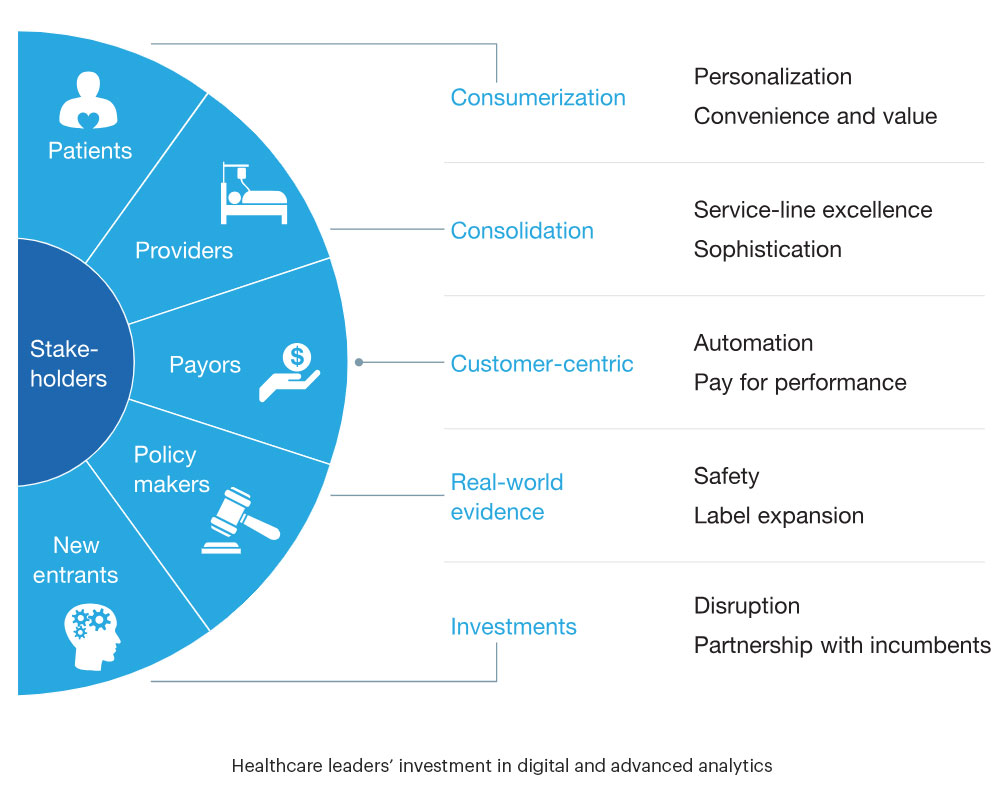Case Study

Navigating the Healthcare Digital Disruption: Strategies for Business Success
The healthcare industry finds itself at the precipice of a monumental digital transformation. New technologies are reshaping the landscape of healthcare delivery, revolutionizing how patients interact with their providers and transforming how data is collected and analyzed. This digital disruption brings with it both challenges and opportunities for healthcare organizations. On the one hand, keeping up with the rapid pace of change can be demanding. Still, on the other hand, it presents significant opportunities to enhance efficiency, elevate patient experience, and revolutionize the overall value of healthcare delivery.

Source: McKinsey
Factors Contributing to the Healthcare Evolution
1. Interoperability and Data Exchange: As healthcare systems digitize, the need for seamless interoperability and data exchange between different systems becomes paramount. Health Information Exchanges (HIEs) and interoperability standards such as FHIR (Fast Healthcare Interoperability Resources) enable the secure exchange of patient data among diverse healthcare providers. It promotes seamless care continuity and minimizes redundant tests and procedures.
2. AI-Powered Drug Discovery and Research: AI transforms drug discovery and research beyond clinical applications. AI algorithms can scrutinize extensive scientific data, pinpoint potential drug candidates, and forecast their possible outcomes. Embracing AI-driven research can expedite drug development, leading to innovative treatments and therapies. The utilization of AI is set to expand further and probably result in a reduction of 5 to 10 percent in healthcare expenditures in the United States.
3. Virtual Reality (VR) and Augmented Reality (AR) in Healthcare: VR and AR technologies are finding applications in medical training, patient education, and surgical procedures. These technologies offer immersive experiences that enhance medical training and enable surgeons to visualize and plan complex processes more effectively. Patient education improves through interactive models, fostering a better understanding of medical conditions and treatments.
4. Blockchain for Data Security: Blockchain's decentralized, tamper-proof structure safeguards patient records and authenticates medical devices across the supply chain, easing some of healthcare's security and transparency concerns. It fosters secure data sharing, patient data control, and interoperability between healthcare entities. By boosting data security and trust, blockchain transforms healthcare information management.
5. Predictive Analytics for Public Health: Data analytics predicts outbreaks, guides interventions, and enhances population health. By analyzing diverse data sources such as electronic health records, social media, and environmental factors, predictive analytics offers valuable insights into disease potential. This proactive approach aids resource allocation, targeted interventions, and epidemic mitigation, showcasing a significant stride toward data-driven healthcare decision-making.
Strategies for Modernizing Healthcare Solutions
As we embark on this journey through digital transformation, our focus lies on exploring essential strategies that healthcare organizations can employ to effectively navigate the complexities of digital disruption and pave the way for unprecedented business success. These strategies encompass a wide array of cutting-edge technologies and innovative approaches that, when wielded wisely, can revolutionize the healthcare landscape.
1. Embrace AI: Among the key strategies dominating today's digital evolution, none stands as prominently as the adoption of Artificial Intelligence (AI) in healthcare. AI has already demonstrated its immense value by supporting complex surgical procedures, guiding the usage of medical devices, and identifying intricate patterns in patient data for more accurate diagnoses. As AI implementation continues to expand, it holds the potential to generate substantial cost savings, with projections indicating it could save up to a staggering $360 billion annually in healthcare expenditures. By integrating AI-powered solutions, healthcare organizations can bolster decision-making, streamline operations, and elevate patient care to unprecedented heights.
2. Focus on Data and Analytics: Leveraging data analytics is a great way for healthcare organizations to unlock valuable insights into patient trends, treatment efficacy, and operational efficiency. Through data-driven decision-making, healthcare providers can optimize resource allocation, identify patterns for improved treatment outcomes, and fine-tune their operations for maximum efficiency. Per a report by MarketsandMarkets, the healthcare analytics market is expected to experience exponential growth, reaching a staggering USD 85.9 billion by 2027, a remarkable rise from USD 27.4 billion in 2022. Healthcare organizations that invest in robust data analytics tools and build data analysis capabilities stand poised to harness the power of data to drive unparalleled advancements in patient care.
3. Invest in Cybersecurity: As healthcare systems increasingly embrace digitization, data security becomes a paramount concern. The cloud offers enhanced cybersecurity solutions for safeguarding valuable healthcare data in the face of escalating data breaches. With the average breach cost reaching $10 million, safeguarding against disruptions to patient care and stolen records is extremely important. The escalating use of medical and Internet of Things (IoT) devices necessitates the implementation of robust security measures, such as encryption, access controls, and regular security audits, to safeguard data integrity and maintain patient trust.
4. Focus on Patient Experience: The digital revolution in healthcare presents an unprecedented opportunity to elevate the patient experience. In this digital age, patients now expect personalized and on-demand interactions with the companies they engage with as well as the healthcare providers they seek. According to a research report, 78% of patients prefer communicating with healthcare systems through their preferred channels, while 75% express greater loyalty to physicians who prioritize improving their overall experience. To meet these expectations and foster unwavering patient loyalty, healthcare organizations must invest in user-friendly digital platforms and mobile applications that offer seamless interactions and personalized care.
5. Encourage a Culture of Innovation: Fostering a culture of innovation is a powerful catalyst that empowers healthcare organizations to embrace digital disruptions and drive continuous improvement. Encouraging creativity and exploration of groundbreaking technologies like AI, telehealth, and data analytics allows employees to conceive inventive solutions that enhance patient care and boost operational efficiency. By providing opportunities for professional development and upskilling, organizations ensure a skilled and agile workforce capable of embracing the full potential of digital advancements, leading the way in healthcare innovation.
6. Collaborate with Technology Partners: Collaborating with technology partners specializing in healthcare solutions offers immense benefits for healthcare organizations. These strategic partnerships facilitate access to cutting-edge technology, expertise, and resources, empowering healthcare providers to remain at the forefront of technological advancements. It also enables organizations to enhance diagnostic capabilities, refine treatment methods, and streamline administrative processes, driving the transformation of healthcare delivery.
7. Integrate FHIR for Interoperability: Fast Healthcare Interoperability Resources (FHIR) is a crucial component in the modernization of healthcare solutions. FHIR facilitates seamless interoperability by providing a standardized framework for exchanging health information. Integrating FHIR into healthcare systems enables the smooth sharing of data among different applications and platforms, such as electronic health records (EHRs), mobile health apps, and other health-related services. Here’s a demo video on how we can make FHIR work for you.
Conclusion
In summary, the digital disruption in healthcare presents both challenges and opportunities. By implementing the above mentioned strategies, healthcare organizations can effectively navigate this digital transformation, maximize its benefits, and achieve business success. Embracing AI, leveraging data analytics, prioritizing cybersecurity, enhancing patient experience, fostering innovation, and collaborating with technology partners are all critical steps toward thriving in the evolving healthcare landscape. As the digital revolution continues, staying adaptable, innovative, and patient-centric will be vital to maintaining a competitive edge and delivering exceptional healthcare services.
Intelliswift is a leading provider of cutting-edge digital healthcare technology solutions, fusing exceptional patient care with deep healthcare domain knowledge. Our mission is to transform healthcare through secure, compliant digital innovations. Our HIT experts offer extensive collective experience in healthcare digital transformation, including system modernization and cloud migration. Reach out to us now to know how we can help effectively navigate the disruptions caused by digital advancements in the healthcare industry.


